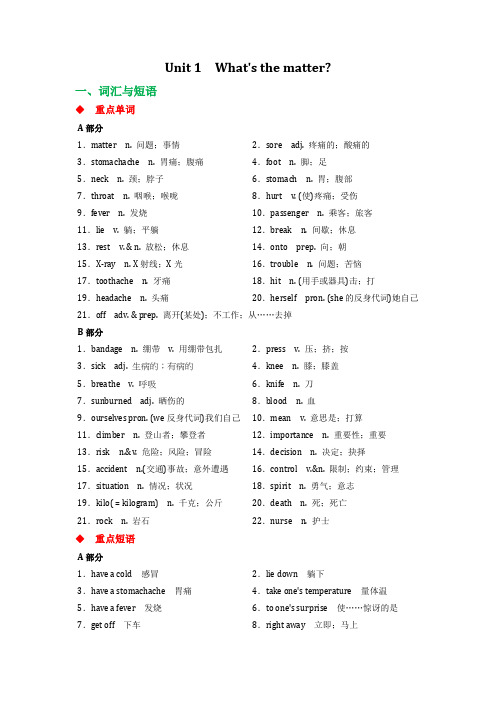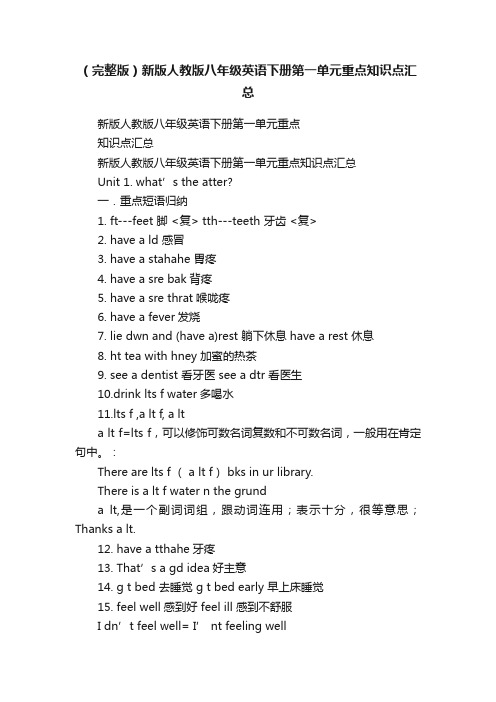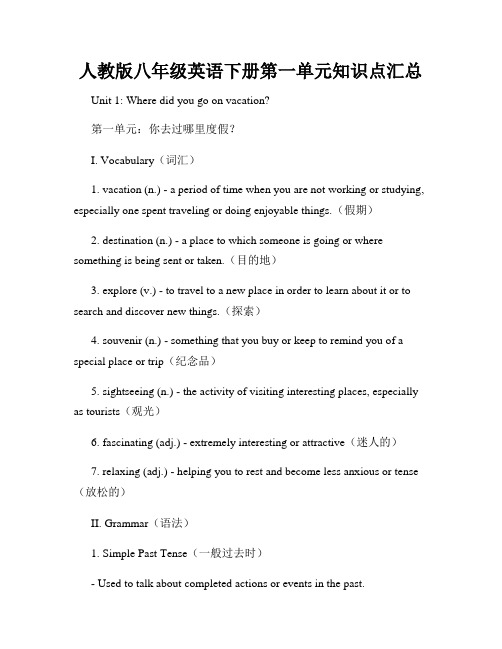新版人教版八年级英语下册第一单元知识点.doc
- 格式:doc
- 大小:178.51 KB
- 文档页数:4

Unit 1 What's the matter?一、词汇与短语◆重点单词A部分1.matter n. 问题;事情2.sore adj. 疼痛的;酸痛的3.stomachache n. 胃痛;腹痛4.foot n. 脚;足5.neck n. 颈;脖子6.stomach n. 胃;腹部7.throat n. 咽喉;喉咙8.hurt v. (使)疼痛;受伤9.fever n. 发烧10.passenger n. 乘客;旅客11.lie v. 躺;平躺12.break n. 间歇;休息13.rest v. &n. 放松;休息14.onto prep. 向;朝15.X-ray n. X射线;X光16.trouble n. 问题;苦恼17.toothache n. 牙痛18.hit n. (用手或器具)击;打19.headache n. 头痛20.herself pron. (she的反身代词)她自己21.off adv. & prep. 离开(某处);不工作;从……去掉B部分1.bandage n. 绷带v. 用绷带包扎2.press v. 压;挤;按3.sick adj. 生病的;有病的4.knee n. 膝;膝盖5.breathe v. 呼吸6.knife n. 刀7.sunburned adj. 晒伤的8.blood n. 血9.ourselves pron. (we反身代词)我们自己10.mean v. 意思是;打算11.climber n. 登山者;攀登者12.importance n. 重要性;重要13.risk n.&v. 危险;风险;冒险14.decision n. 决定;抉择15.accident n.(交通)事故;意外遭遇16.control v.&n. 限制;约束;管理17.situation n. 情况;状况18.spirit n. 勇气;意志19.kilo( = kilogram) n. 千克;公斤20.death n. 死;死亡21.rock n. 岩石22.nurse n. 护士◆重点短语A部分1.have a cold 感冒2.lie down 躺下3.have a stomachache 胃痛4.take one's temperature 量体温5.have a fever 发烧6.to one's surprise 使……惊讶的是7.get off 下车8.right away 立即;马上9.take breaks (take a break) 休息10.talk too much 说得太多11.drink enough water 喝足够的水12.have a very sore throat 嗓子非常疼13.get an X-ray 拍X光片14.see a dentist 看牙医15.drink some hot tea with honey 喝一些加蜂蜜的热茶16.put some medicine on sth.在……上面敷一些药17.feel very hot 感到很热18.sound like 听起来像19.all weekend 整个周末20.in the same way 以同样的方式21.go to a doctor 看医生22.go along 沿着……走23.on the side of the road 在马路边24.shout for help 大声呼救25.without thinking twice 没有多想26.have a heart problem 有心脏病27.thanks to 多亏了;由于28.in time 及时29.save a life 挽救生命30.get into trouble 陷入麻烦31.hurt oneself 受伤32.fall down落下;摔倒B部分1.be used to 习惯于……;适应于……2.in a difficult situation 在困境中3.take risks (take a risk) 冒险4.keep on doing sth. 继续(或坚持)做某事5.run out (of) 用尽;耗尽6.make a decision 作出决定7.cut off 切除8.get hit on the head 撞到头部9.get out of 离开;从……岀来10.be interested in 对……感兴趣11.give up 放弃12.mean doing sth. 意味着做某事13.put a bandage on sth. 用绷带包扎…14.lose one's life 失去生命15.feel sick 感到恶心16.mountain climbing 登山运动17.have problems breathing 呼吸困难18.be in control of 掌管;管理◆重点句子A部分1.What's the matter with you?=What's the trouble with you?=What's wrong with you?你怎么了?2.What should she do? 她该怎么办呢?3.Did you fall down? 你跌倒了吗?4.Should I take my temperature? 我应该量一下体温吗?5.I think I sat in the same way for too long without moving.我想我以同样的姿势一动不动地坐得太久了。

最新人教版八年级英语下册第一单元知识点汇总Unit 1 What’s the matter?一、基础知识1.我感冒了。
可以表达为I had a cold、catch a cold或have the flu。
have a fever表示发烧,have a cough表示咳嗽,have a stomachache或肚子疼表示胃疼,have a toothache表示牙疼,have a headache表示头疼。
2.将身体部位和ache(疼痛)结合起来构成新的复合词,如stomach+ache=stomachache,head+ache=headache,tooth+ache=toothache,back+ache=backache,表示相应的疼痛。
3.“怎么啦?出什么事情了?”可以表达为What’ s the matter。
也可以用What’ s the trouble with you?或What’ s wrong with you。
matter和trouble为名词,其前可加the或形容词性物主代词,而wrong是形容词不能加the。
用于询问某人有什么病或遇到什么麻烦、问题,其后跟询问对象时,与介词with连用,如What’s the matter with sb。
= What’s your trouble?= What’s up?= What happens to sb。
举例来说,当问到“What’s the matter with you?”时,回答可以是“I have a bad cold.”4.maybe表示“或许”,常用于句首,表示可能性,后加句子。
例如Maybe you are right。
may be是情态动词+be的结构,意为“可能,也许”,后加名词、代词或形容词。
例如He maybe angry。
sound like可以和名词、代词以及从句结合使用,如It sounds like you don’t know the truth.It sounds like a good idea。

(完整版)新版人教版八年级英语下册第一单元重点知识点汇总新版人教版八年级英语下册第一单元重点知识点汇总新版人教版八年级英语下册第一单元重点知识点汇总Unit 1. what’s the atter?一.重点短语归纳1. ft---feet 脚 <复> tth---teeth 牙齿 <复>2. have a ld 感冒3. have a stahahe 胃疼4. have a sre bak背疼5. have a sre thrat喉咙疼6. have a fever发烧7. lie dwn and (have a)rest 躺下休息 have a rest 休息8. ht tea with hney 加蜜的热茶9. see a dentist 看牙医 see a dtr 看医生10.drink lts f water多喝水11.lts f ,a lt f, a lta lt f=lts f,可以修饰可数名词复数和不可数名词,一般用在肯定句中。
:There are lts f ( a lt f) bks in ur library.There is a lt f water n the grunda lt,是一个副词词组,跟动词连用;表示十分,很等意思;Thanks a lt.12. have a tthahe牙疼13. That’s a gd idea好主意14. g t bed 去睡觉 g t bed early 早上床睡觉15. feel well感到好 feel ill 感到不舒服I dn’t feel well=I’ nt feeling well我感觉不舒服.16. start ding/ t d sth开始做某事T D 是一件事情完成了,开始做另外一件事情DING是原的那件事情做到一半,现在又开始做了,是同一件事情。
17. tw days ag两天前18. get se rest 多休息, 休息一会儿19. I think s我认为是这样20. be thirsty口渴21. be hungry 饥饿22. be stressed ut紧张23. listen t usi听音乐24. healthy lifestyle健康的生活方式25. traditinal hinese dtrs传统中医26. need t d sth 需要做某事I have a tthahe. I need t see a dentist. 我牙痛, 我需要去看牙医.e need t keep ur lassr lean. 我们需要保持教室的干净.27. a balane f yin and yang阴阳平衡28. fr exaple例如29. t uh yin太多的阴, 阴气太盛t uh + 不可数名词太多的…uh t +形/副实在太…极其,非常t any + 可数名词复数太多的…30.be gd fr sth./ ding sth. 对什么有益,对什么有好处be bad fr sth./ ding sth. 对什么有害be gd t 对…好be gd at =d well in 在……方面好,擅长be gd(bad) fr、be gd at的相关用法1.be gd fr 对......有益Ding rning exerises is gd fr yur health.做早操对你们的建康有益。

人教版八年级英语下册Unit 1知识点人教版八年级英语下册Unit 1知识点Unit 1 Will people have robots?重点语法:一般将来时态的应用do/does 的一般将来时态形式:(shall/will) dodo/does 的一般将来时态的被动语态:(shall/will)be done一般将来时态的肯定句、否定句、疑问句形式:肯定句例句:People will have robots in a few years.否定句例句:People (will not/won't) have robots in a few years.一般疑问句例句:Will people have robots in a few years?特殊疑问句例句:What will people have in a few years?重点短语:won't = will notthey'llwillshe'll = she willhe'll = he willI'll = I willfall in love with(sb./sth.)爱上(某人/某物)be able to do sth. 能够做某事come true 实现uture 未来hundreds of 数以百计的thousands of 数以千计的look for(sb./sth.)寻找(某人/某物)will → would 情态动词 will 的原形和过去式may → might 情态动词 may 的原形和过去式Reading Strategy(阅读方法)Look ale and picture, and predict what you will read about. (看着标题和图片,预知你要阅读那些方面的内容。
)This helps you get ready to acquire new information. (这样可以帮助你获得一些新的信息。

人教版八年级英语下册第一单元知识点汇总Unit 1: Where did you go on vacation?第一单元:你去过哪里度假?I. Vocabulary(词汇)1. vacation (n.) - a period of time when you are not working or studying, especially one spent traveling or doing enjoyable things.(假期)2. destination (n.) - a place to which someone is going or where something is being sent or taken.(目的地)3. explore (v.) - to travel to a new place in order to learn about it or to search and discover new things.(探索)4. souvenir (n.) - something that you buy or keep to remind you of a special place or trip(纪念品)5. sightseeing (n.) - the activity of visiting interesting places, especially as tourists(观光)6. fascinating (adj.) - extremely interesting or attractive(迷人的)7. relaxing (adj.) - helping you to rest and become less anxious or tense (放松的)II. Grammar(语法)1. Simple Past Tense(一般过去时)- Used to talk about completed actions or events in the past.- Regular verbs: add -ed to the base form of the verb. Example: walked, talked.- Irregular verbs: do not follow the regular pattern. Example: went, ate.2. Adverbs of Frequency(频度副词)- Used to show how often something happens.- Examples: always, sometimes, often, rarely, never.III. Sentence Structure(句子结构)1. Questions with "Where"(带有"Where"的疑问句)- Used to ask about the location or place.- Example: Where did you go on vacation?2. Answers with "I went to..."(回答时使用"I went to...")- Used to respond to a question about where someone went on vacation.- Example: I went to the beach.IV. Communication(交际)1. Asking for and giving information(询问和提供信息)- Used to ask about and provide details of a vacation.- Example: A: Where did you go on vacation? B: I went to Paris.2. Expressing preferences(表达偏好)- Saying what you like or dislike about a vacation.- Example: I liked the food in Italy, but I didn't enjoy the crowded streets.V. Culture Corner(文化角落)1. Different types of vacations(不同类型的度假方式)- Beach vacation: spending time at the beach and enjoying the sun and sea.- Safari vacation: going on a wildlife adventure in natural reserves.- City vacation: exploring cities and visiting famous landmarks.- Mountain vacation: enjoying outdoor activities in mountainous regions.- Cultural vacation: immersing yourself in the local culture and traditions.总结:本单元主要学习了与度假相关的词汇以及过去式的用法。

Unit 1 What’s the matter?一、重点短语1. have a fever 发烧2. have a cough 咳嗽3. have a toothache 牙疼4. talk too much 说得太多5. drink enough water 喝足够的水6. have a cold 受凉;感冒7. have a stomachache 胃疼8. have a sore back 背疼9. have a sore throat 喉咙痛10. lie down and rest躺下来休息11. hot tea with honey加蜂蜜的热茶12. see a dentist看牙医13. get an X-ray拍X光片14. take one’ s temperature量体温15. put some medicine on sth在……上面敷药16. feel very hot 感到很热17. sound like 听起来像18. all weekend 整个周末19. in the same way以同样的方式20. go to a doctor 看医生21. go along 沿着……走22. on the side of the road 在马路边23. shout for help 大声呼救24. without thinking twice 没有多想25. get off 下车26. have a heart problem 有心脏病27. to one’ s surprise 使……惊讶的28. thanks to 多亏了;由于29. in time及时30. save a life 挽救生命31. get into trouble 造成麻烦32. right away 立刻;马上33. because of 由于34. get out of 离开35. hurt oneself 受伤36. put a bandage on sth. 用绷带包扎37. fall down 摔倒38. feel sick 感到恶心39. have a nosebleed 流鼻血40. cut his knee割伤他的膝盖41. put her head back 把她的头向后仰42.have problems breathing呼吸困难43. mountain climbing登山运动44. be used to doing sth. 习惯做某事45. run out (of) 用完;用尽46. so that 以便47. so…that 如此……以至于……48. be in control of 掌管;管理49. in a difficult situation 在逆境屮50. keep on doing sth.坚持做某事51. make a decision做出决定52. take risks 冒险53. give up 放弃二、知识点解析1. What’s the matter? 怎么了?若是询问“某人怎么了?”要用“What’s the matter with sb.?”拓展:What’s the matter with sb.? 的同义句:What’s wrong with sb.? / What’s the trouble with sb.?2.疾病类短语:have a +疾病. e.g. :have a fever 发烧have a cold 感冒have a cough 咳嗽.have a +身体部位-ache. e.g.: have a headache 头痛have a toothache 牙痛.have a sore+身体部位. e.g.: have a sore throat咽喉痛have a sore back背痛例题:Mom, I____________.I’m sorry to hear that, dear. We must go to see the dentist right away.A. have a headacheB. have a stomachacheC. have a toothacheD. have a fever3. lie down 躺下V. 躺,平躺。
【导语】下⾯是为您整理的新⼈教版英语⼋年级下册第⼀单元知识点归纳,仅供⼤家参考。
Unit 1 What’s the matter?⼀、基础知识1. What’ s the matter? 怎么啦?出什么事情了?【解析】matter/ ' mætə(r)) /n.问题;事情What’ s the matter with you?= What’s the trouble with you? = What’ s wrong with you? 你怎么了?【注】: matter 和trouble 为名词,其前可加the 或形容词性物主代词,wrong 是adj. 不能加the【⽤法】⽤于询问某⼈有什么病或某⼈遇到什么⿇烦、问题其后跟询问对象时,与介词with连⽤。
即:What’s the matter with sb.? = What’s your trouble? = What’s up? = What happens to sb.?— What’s the matter with you ? — I have a bad cold.2. I had a cold.我感冒了。
have a cold=catch a cold=have the flu感冒have a fever 发烧 have a cough咳嗽 have a stomachache胃疼,肚⼦疼 have a toothache⽛疼 have a headache头疼3. ⾝体部位+ache(疼痛)构成新的复合词stomach+ache=stomachache head+ache=headache tooth+ache=toothache back+ache=backache后背痛4. much too+ 形容词,意为太...... ,too much+名词,意为很多,⼤量。
5. enough【形容、副词】⾜够的/地,enough放在名前后,形副后。
八年级英语第一单元知识点归纳1. be scared of sb./sth. 恐惧某人/某物2. go up 上升,与rise 同义,与go down 或set 相反3. make a noise 发出声响,吵闹4. arrive in 到达,表示到达某一城市、国家等大地方时,用介词in;表示到达某一村庄、车站等小地方时,用介词at ;到达的地方用副词表示时,可不用介词。
5. not…until…直到……才……6. see…doing…停止做某事7. go cycling 相当于 go to ride a bike ,意思是去骑车。
8. nit sb. on the head 表示“打某人的头”,表示的“打某人的脸”要用hit sb. in the face 。
9. turn around 转身10. fall off 摔下来11. give sb. a push 推某人一下12. help sb. do sth. = help sb. with sth. 帮助某人做某事13. get off 从……下来,通常指下火车、巴士、轮船、飞机等。
14. think about 思考、想起、想到(某人或某事)15. all day 一整天16. one by one 一个接一个地,类似有year by year 一年又一年;day by day 一天又一天。
八年级英语第二单元知识点归纳1. grow into 长成……2. pass sb. sh. = pass sth. to sb. 递给某人某物3. billions of 数十亿的,hundred, thousand, million , billion等词前面有具体数字时,其本身用单数形式,直接修饰名词;表示一个笼统的概念时,这些词用复数形式,而且常与介词of连用修饰名词。
4. look after = take care of 照顾,照料。
5. be full of 满,充满=be filled with6. be made of/from由……制成,be made of 表示在制成的过程中,原材料没有发生质的变化;be made from 表示在制成的过程中,原材料发生质的变化。
Unit 1 What’s the matter?一、重点短语1. have a fever2. have a cough3. have a toothache4. talk too much5.drink enough water6. have a cold7. have a stomachache6.8. have a sore back9. have a sore throat 10. lie down and rest11. hot tea with honey 12. see a dentist13. get an X-ray 14. take one’ s temperature15. put some medicine on sth. 16. feel very hot17. sound like 18. all weekend19. in the same way 20. go to a doctor21. go along 22. on the side of the road23. shout for help 24. without thinking twice25. get off 26. have a heart problem27. to one’ s surprise 28. thanks to29. in time 30. save a life31. get into trouble 32. right away33. because of 34. get out of35. hurt oneself 36. put a bandage on sth.37. fall down 38. feel sick39. have a nosebleed 40. cut his knee41. put her head back 42. have problems breathing43. mountain climbing 44. be used to doing sth.45. run out (of) 46. so that47. so. . . that 48. be in control of49. in a d iffic u lt situation 50. keep on doing sth.51. make a decision 52. take risks53. give up 放弃二、重点句型1. What’ s the matter?What’ s the matter with you?= What’s the trouble with you? = What’ s wrong with you?你怎么了?2. What should she do? 她该怎么办呢?Should I take my temperature? 我应该量一下体温吗?主语+ should/shouldn’t + 动词原形. ..①You should lie down and rest. 你应该躺下休息一会儿。
人教版英语八年级下册第一单元知识点Unit 1 What ’s the matter?【单词】matter /'m?t ?/ n. 问题 ; 事情What ’s the matter 〔 with sb. 〕?怎么啦?出什么事情了?咨询有什么病或碰到什么麻烦、问题sore /s ?:/ adj. 难过的 ,酸痛的;愤慨的--have a sore back 后背痛 --sore throat 咽喉痛n. 溃疡,痛点;恨事pressure sore 褥疮, sore spot 伤疤,痛点;伤心事,旧疮疤stomachache ['st ?m?ke?k] n. 胃痛 ; 腹痛 stomach /'st ?m?k/ n. 胃; 腹部 foot /f ?t/ n. 脚 ; 足pl. feet-- on foot 步行;在进行中-- at the foot of 在 〔山〕脚下;在的下部neck /nek/ n. 颈 ; 脖子--necklace 项链 -- necktie 领带 --neck and neck (with sb.)(与 )齐驱并驾,不分上下throat / θ r? 咽喉;喉咙t/ n.fever /'fi:v ?/ n. 发热have a fever 发热lie /la ?/ -- vi. 躺 , 平躺;位于,存在lie down 躺下--vi. 谎言,作为不及物动词的变化: p.pr -- lying ,pt-- lied ,pp —lied--vt. 下蛋;放置 e.g., The hen stopped laying eggs. She laid the baby down gently on the bed.作为及物动词是的变化: p.pr -- laying ,pt-- lay ,pp —lainrest v.& n. 放松 ; 休息 cough n.& v. 咳嗽X-rayn. X 射线 ; X 光toothache/'tu:?牙痛θe k/n.temperature 温度,体温take one' s temperature 量体温headache/'hede ?k/ n. 头痛break?k/ n. 间歇;休息take breaks (take a break) 休息/brevi. vt. pt-- broke ,pp —broken--break away (from) 走开,放弃〔习惯〕 ,打破〔陈套〕--break down (机器等 )坏了; (方案等 )失败; (健康等 )变坏;感情失去控制 --break in 插嘴,使驯服--break into 破门而入,突然。
2014 年初二下单元知识点Unit 1 What’ s the matter一.知识要点。
1. 询问身体状况。
What’ s the matter with you Wha t ’ s your trouble Wha t ’ s wrong with you What’ s up (用于询问某人有什么病或某人遇到什么麻烦、问题其后跟询问对象时,与介词with 连用 )How are you feeling now Are you feeling better today回答身体病痛: have a sore throat患喉咙痛have a sore back患背痛have a fever发烧have a cold =catch acold 患感冒 have a stomachache患胃痛have a toothache患牙痛have a headache 患头痛have a backache 患背痛2. There is something wrong with the one’ s +身体部位。
3.反身代词的用法:myself ourselves yourself yourselves himself herself itself themselves跟主语一致: The child can dress himself. ( 作宾语 ) Mrs. Black herself is a teacher. ( 作同位语 )Just be yourself. ( 作表语 )固定短语: teach oneself sth ( 自学 ) learn sth by oneself (自学) enjoy oneself (玩的开心) help oneselfto sth (随便吃什么)say to oneself (自言自语)introduce oneself ( 自我介绍 )4. too much + 不可数名词too many+ 可数名词 much too + 形容词或副词5. enough water old enough ( 名前形、副后 )6. lie down and rest lie – lay — lain lying lie 还有撒谎的意思。
它的过去式为lied . rest = have a rest7. maybe “或许”,常用于句首,表示可能性,后加句子。
Maybe you are right.may be ,是情态动词 +be 的结构,意为“可能,也许”,后加名词、代词或形容词。
He may be angry.8. sound like+ 名词代词和从句: It sounds like you don ’t know the truth. It sounds like a good idea.sound+形容词,“听起来,好像” , The music sounds nice.9.need 需要,实义动词 need+名词,需要某物;need to do sth.需要做某事,主语通常是人,表示人主动的动作:You need to listen carefully during class.need doing sth.主语通常是物,表示被动的动作:Your dirty clothes need washing.needn’t = don ’t have to没有必要mustn ’ t不准must ,need引导的疑问句肯定回答用must. 否定回答用needn ’ t或don’t have to如:—Must I finish my homework now — No, you ______. You can go home now. A. needn ’t B. mustn’t C. shouldn ’t D. can ’tto a doctor = see a doctor see a dentist = go to a dentist11. see sb do sth see sb doing sth (感官动词的用法,看见某人做过某事用原形,看见某人正在做某事用现在分词 )这样的词语有:hear, listen to , look at, watch , feel, find12. get off get on get over(克服) get on/ along well with和某人相处得好,get up起床get back取回13. to one ’ s surprise 令某人惊奇的是in surprise 惊奇地be surprised to do sth 做某事感到惊奇地be surprised at sth 对 ..... 感到惊奇地14. agree with sb agree to ( do) sth agree on 达成一致意见15. Thanks to = because of16. in time 及时 on time 准时17. right away = right now = at once18. get into trouble 造成麻烦 be in trouble 处于困难当中make trouble 制造麻烦 have trouble / difficulties(in) doing sth 做某事有困难19. advice [ 不可数名词 ] 劝告,建议,向征求意见,give sb. advice on sth. 就某事给某人建议;advise [ 动词 ] advise sb. to do sth. advise doing sth give sb advice on sth 就某事给某人建议20. hurt 及物动词,使疼痛,受伤,He hurt his leg while exercising. 不及物动词,(部位)疼。
His leg hurt badly.21. hit (用手或器具)打;击打The boy hit the dog with a sb. on the head/ nose/ back 打某人的头、鼻子、后背, on 用在所打较硬的部位;hit sb. in the face/ eye/ stomach 打某人的脸、眼睛、肚子,in 用在所打较软的部位。
22. be used to sth./ doing sth . 习惯于、适应了、做某事,强调状态;His grandpa was used to country life.Mary is not used to getting up early in the morning. get/ become used to sth./ doing sth. “变得习惯,逐渐适应”强调过程、动作: It ’s difficult for one to get used to another country ’s habit. be used to do sth= be used for doing sth 被用来做 ..... used to do sth 过去常常做 ......23. free [ 形容词 ] 空闲的 free time ;免费的 the drink is for free ;自由的 I want to become a free bird.free 【动词】使解脱,得到自由He could not free his arm.24.. run out 用完,用尽 When his water run out, he knew that he would have to do something to save his own life.物 sth. run out. 某物用尽了。
人 sb. run out of 物 sth.. 人用尽了某物。
He run out of all his money last night. down 摔倒, fall off 从 ..... 掉下来 fall in love with 爱上 ...... fall asleep 熟睡 fall into 掉进 fallbehind 落后26. risk (sb.) to do sth. 冒险去做某事 take a risk=take risks 冒险27. the importance of (doing) sth. (做)某事的重要性Westudents should know the importance of (learning) English. importance n. 重要(性), important adj.重要的, unimportant adj.28. be in the control of 掌管,管理The headmaster is in the control of this new school.be out of control 无法控制,无法管理be under control 被控制住,在控制之中29. mind意为,mind doing sth., Would you mind my opening the window30. give up (doing) sth.=stop doing sth放弃(做)某事,give up (playing) computer games;give up后可接名词、代词和动词ing 形式,也可不接,如Never give up easily.give in 屈服 give out 分发 give back 归还31. be interested in = have /take an interest in 对 ... 感到兴趣 places of interest 名胜 lost interest in 失去兴趣 of the exciting things one of the + 形容词 + 名词复数 33. almost = nearly 几乎 hardly 几乎不34. on that day 具体的某一天35. his own life own 的前面用所有格36. mean doing sth 意味着做某事mean to do sth 打算做某事What does .... mean What ’ s the meaning of ... 的意思37. make decisions = make a decision = make up one ’ s ming = decide to do sth 决定做某事on doing sth 坚持做某事 keep sth + adj 保持某物某种状态sb do sth find sb doing sth find it + adj + to do sth ( 发现做某事怎样 ) find it difficult / hard to do sth(发现做某事很难) 40. feel sick 生病;不舒服sick /ill adj. 生病的 (1) sick adj. “生病的”,既可放be ( 系动词 ) 后作表语,也可放n. 前作定语。